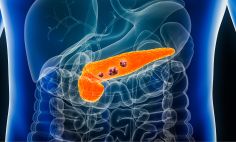About 1.7% of people in the United States will be diagnosed with pancreatic cancer at some point in their lives. Despite being the 10th most common type in the United States, pancreatic cancer is the third most common cause of cancer deaths.
Pancreatic cancer may not cause any signs or symptoms at first, making it hard to spot early. But research funded by the National Cancer Institute (NCI) at the National Institutes of Health (NIH) may improve detection and treatment.
Tools for finding pancreatic cancer sooner
There’s no routine screening test to spot pancreatic cancer early, but researchers at the City of Hope Duarte Cancer Center in California sought to change that with a simple blood test. In a study of about 1,000 people, researchers analyzed a small sample of genetic material taken from tumors and were able to detect early- and late-stage pancreatic cancer. While more study is needed, researchers say this could help people who are already at high risk for pancreatic cancer.
Regular imaging tests may also benefit high-risk patients, according to a long-running research study at the Johns Hopkins Kimmel Cancer Center’s Sol Goldman Pancreatic Cancer Research Center. The study included about 1,700 people at high risk and researchers focused on 26 participants who had been diagnosed with pancreatic cancer.
Imaging tests, such as MRIs and ultrasounds, were used to see inside the pancreas and other parts of the body. Monitoring the pancreas with regular imaging tests improved the likelihood of early-stage cancer diagnosis and increased the life expectancy compared to live those who were not screened.

Researchers are trying to better screen patients for pancreatic cancer with a new blood test.
Treatment options using new and existing medicines
Chemotherapy is a common treatment for early-stage pancreatic cancer, but it can cause serious side effects. In 2023, researchers found a promising new class of drugs, called KRAS inhibitors, that shrank pancreatic tumors caused by a gene mutation or stopped their growth entirely. KRAS inhibitors have been used in many other cancer studies. However, these drugs don’t work in all patients when used alone. Researchers now believe that giving chemotherapy and KRAS inhibitors together may be more effective. A new study in mice showed that tumors grew and spread more slowly when the medicines were used together compared to when each medicine was used alone. This method could allow doctors to give patients lower doses of chemotherapy.
Ongoing studies
In rare cases, a new diabetes diagnosis can be an early sign of pancreatic cancer. About 1 in 4 people diagnosed with pancreatic cancer were first diagnosed with diabetes. And about 1 in 100 people with new onset diabetes are diagnosed with pancreatic cancer within 3 years of their diabetes diagnosis.
To find those cases, this study is assessing a large cohort of people with newly diagnosed diabetes. Participants will give blood samples over three years and researchers will look for changes in the blood from participants who develop pancreatic cancer during the study. Their goal is to develop a blood test that can identify which people with newly diagnosed diabetes need to be screened for pancreatic cancer.
Be part of future research
Learn more about emerging pancreatic cancer research on NCI’s website. Clinical trials are underway for early- and late-stage cancers. Learn more about pancreatic clinical trials here. Scientific progress happens every year thanks to studies like these!







